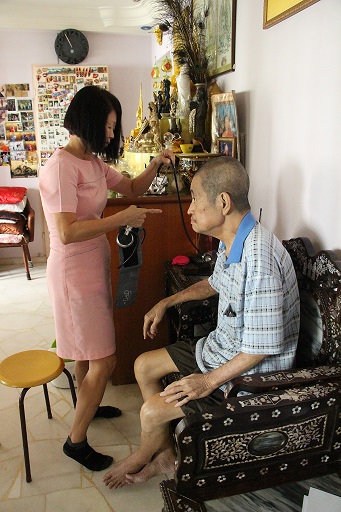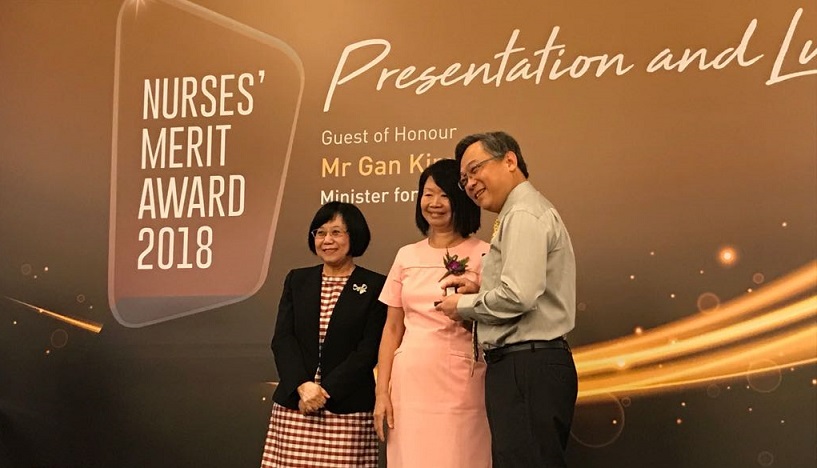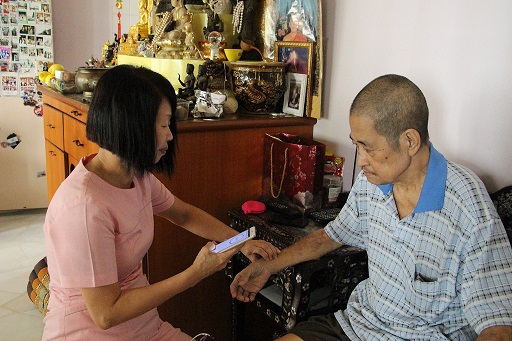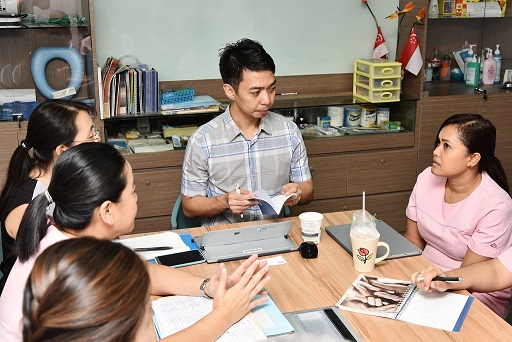
Close



Joo Eng receives the Nurses’ Merit Award from Mr Gan Kim Yong, Minister for Health.
“I am fortunate to have met so many good people,” HCA patient Mr Teo Lai Weng says with a smile. One of the people he is thankful for is his primary care nurse, Ms Tan Joo Eng, 58, who recently won the Nurses’ Merit Award for her dedication.
Armed with a wealth of nursing experience spanning the specialties of surgery, orthopaedics, anaesthesiology and palliative care over more than 20 years, Joo Eng believes in patient-centred care. Her patience and attentiveness are evident in her interactions with Mr Teo, who has been diagnosed with end-stage lung cancer.
As Assistant Nurse Manager of HCA – Ci Yuan Hougang Centre, Joo Eng juggles a hectic schedule. Despite the never-ending list of work tasks, she takes the time to listen to Mr Teo, who shares about his symptoms, daily routines and a new form of therapy that may extend the time he has, but at a prohibitive cost. “She is very responsible and caring, and often calls me to check on my condition,” Mr Teo shares.
Journeys of Hope
Each patient’s journey is unique in its struggles but they are all unified by personal hope, be it a wish to witness the wedding of one’s child, or to revisit a birthplace. For Mr Teo, his wish is simple – to remain independent for as long as possible, doing the things he loves, like cooking bak kut teh. “I like going out to the wet market to buy groceries every now and then,” he shares. “I enjoy cooking for the family.”

Monitoring the patient’s heart rate is routine aspect of Joo Eng’s home visits.
It is these simple joys that give meaning to patients, a source of hope Joo Eng understands deeply. “Every visit I make is an opportunity to know more about them,” she says. “It is important to explore the patient’s feelings about his or her condition and treatment.”
“We help with symptom management and try to improve their quality of life.”
Burn Bright without Burning Out
Death and dying are undoubtedly heavy topics. It takes a certain mental resilience and conscious adjustment on the part of these healthcare professionals to ensure that they do not burn out from the burden they bear on a daily basis.
“Our patients are facing the end of life, unlike other patients who have a chance to make a full recovery,” Joo Eng says. “We often only have a short period to care for them.”
Learning to balance attachment with boundaries gives palliative care professionals the endurance to sustain through the journey. “It is a very emotional job and we have to know the boundaries so that we can lessen the risk of burnout,” she explains. “While it is important to build rapport and connections with the patient and family, we also have to learn how to disconnect when the patient passes on.”
There is an old proverb that is particularly apt in the context of palliative care work: “A sorrow shared is a sorrow halved.”

The daily morning roll call is an opportunity for the clinical team to brainstorm challenging cases.
At roll call each morning, the clinical team discusses cases, particularly challenging ones. “These challenges include poor symptom control, strained family dynamics and caregiver stress,” Joo Eng explains. “It is important that we work as a team and tap on our fellow nurses and doctors for help and advice.”
Most importantly, it is vital to have in place a personal coping mechanism. “I love reading and cooking – it helps me take a break!” Joo Eng shares.